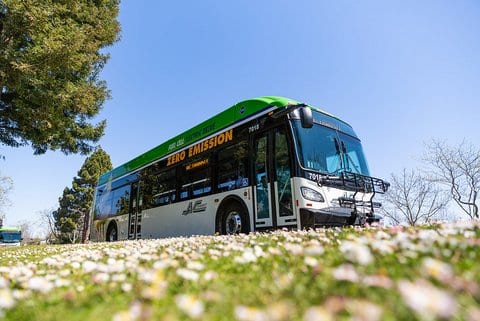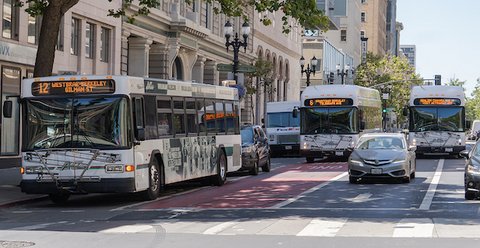
25 Jul Transportation Officials Look to Get More Funding and People on Board

(“AC Transit Bus_Y0A0347171” by California Energy Commission / Flickr / CC BY 2.0 license)
By Andres Jimenez Larios
Bay City News
As Bay Area transit agencies continue to face budget deficits, the Metropolitan Transportation Commission this week discussed new strategies to stabilize and expand public transit.
The group of mayors, county supervisors, and other elected officials that make up the MTC Board of Commissioners talked Wednesday about progress on a state bill that could potentially pave the way for a new long-term source of funding for public transportation in the face of ridership and budget challenges across the region.
Commissioners received updates on California Senate Bill 63, a piece of legislation that would allow for a potential regional sales-tax measure for Bay Area residents to vote on. They also distributed millions of dollars from previous regional measures to several transit agencies for capital projects that would theoretically create more efficient services.
The Connect Bay Area Act, SB 63, sponsored by state senators Scott Wiener, D-San Francisco, and Jesse Arreguin, D-Berkeley, passed key milestones through multiple committees in the California State Legislature but has yet to come to a final vote.
While Alameda, Contra Costa, and San Francisco counties have agreed to participate in the regional measure, San Mateo and Santa Clara Counties have yet to officially join. San Jose Mayor Matt Mahan said he wanted to ensure the responsibility for funding operators like Caltrain will be shared across multiple counties and not burden one in particular.
“Every entity here is not going to get exactly what it wants. That’s just the reality,” said Mahan. “There will be a shared sacrifice if we’re going to raise the funds to address the overarching concern we should all have, which is if we have to significantly cut transit services we’re going to end up in a negative spiral economically and in terms of quality of life for the entire region.”
However, officials at the meeting remained optimistic that all the counties would find a consensus by Aug. 11, the deadline for San Mateo and Santa Clara Counties to opt in before the final versions of the bill are voted on in the Legislature.
The bill would allow for a regional measure to be placed on a ballot for voters in the Bay Area, possibly as soon as 2026. The measure would introduce a 14-year sales tax for five counties, a half-cent for Alameda, Contra Costa, San Mateo, and Santa Clara counties and one cent in San Francisco.
An expenditure plan released by both senators allocates funding for county transit authorities and several of the largest public transit operators in the region, including BART, Alameda/Contra Costa Transit District, Muni, Caltrain, the San Francisco Bay Ferry and Golden Gate Transit, while smaller bus operators would receive millions of much needed operating funds.
“Without good quality public transit, fewer customers and employees could access businesses, fewer fans could attend concerts and sporting events, and thousands of low-income people lose their only transportation option,” Wiener said in a written statement.
After the commissioners expressed gratitude for the people working on SB 63, they quickly moved on to pass several agenda items all at once. One item was the allocation of $21 million to several agencies using toll crossing funds from Regional Measure 3.
About $3 million went to Muni for new electric buses. Just over $13 million went to AC Transit for training and hydrogen refueling projects. The Sonoma-Marin Area Rail Transit system received nearly $5 million to design and build a new bicycle and pedestrian pathway.
The commission also approved $250,000 in Regional Measure 2 funds, also from a previous toll increase, to construct a road between the Palo Alto Transit Center and nearby Quarry Road.
Copyright © 2025 Bay City News, Inc. All rights reserved. Republication, rebroadcast or redistribution without the express written consent of Bay City News, Inc. is prohibited. Bay City News is a 24/7 news service covering the greater Bay Area.






No Comments